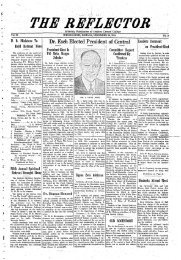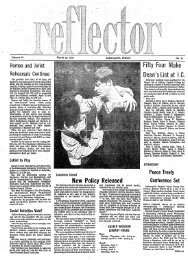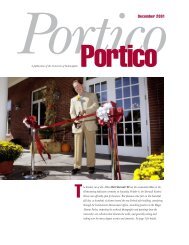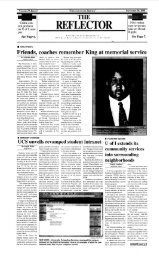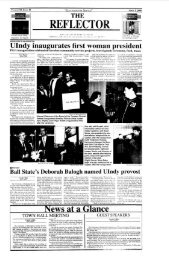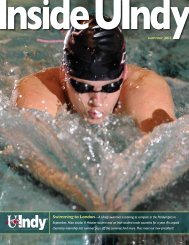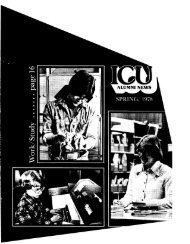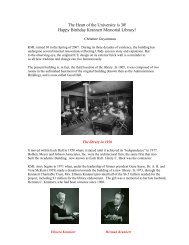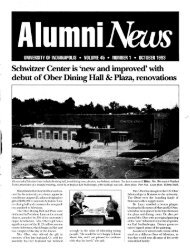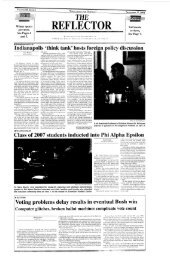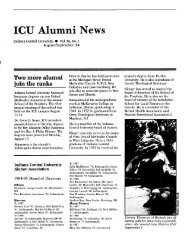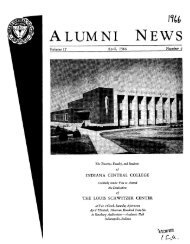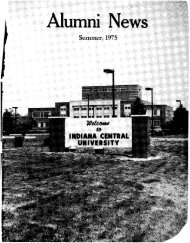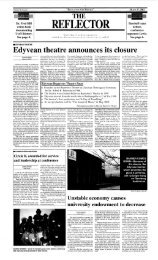1975 - Archives, Krannert Memorial Library, University of Indianapolis
1975 - Archives, Krannert Memorial Library, University of Indianapolis
1975 - Archives, Krannert Memorial Library, University of Indianapolis
Create successful ePaper yourself
Turn your PDF publications into a flip-book with our unique Google optimized e-Paper software.
Dave Hilton Takes Medicine To Honduras<br />
"Many <strong>of</strong> the patients broke down<br />
and wept because they were so grate-<br />
ful. It was very difficult for us to<br />
leave."<br />
These were the words <strong>of</strong> alumnus Dr.<br />
David Hilton '53 <strong>of</strong> Menomonie after a<br />
mission <strong>of</strong> mercy to Honduras last De-<br />
cem ber.<br />
He was accompaned by his son, Ben,<br />
a iunior at Menomonie High, and Dr.<br />
and Mrs. Bruce W. Trimble, <strong>of</strong> Menom-<br />
onie.<br />
The quartet left Friday, December 13,<br />
for Miami, FL, where they were ioined<br />
by 16 other persons from throughout<br />
the country who are trained in the<br />
medical pr<strong>of</strong>ession. The following day<br />
the contingent embarked by plane for<br />
Tegucigalpa, the capital <strong>of</strong> Honduras.<br />
On Sunday, the group from Meno-<br />
monie, along with several other per-<br />
sons, traveled by bus to the mountain<br />
village <strong>of</strong> Manzaragua, located about<br />
90 miles southeast <strong>of</strong> Tegucigalpa. Dr.<br />
Hilton remained here until Thursday<br />
afternoon seeing patients.<br />
The excursion was sponsored by the<br />
Christian Medical Society with the Med-<br />
ical Group Missions, an arm <strong>of</strong> the<br />
society, organizing the trip. Dr. Hilton<br />
said MGM organizes about 10 to 15<br />
such trips annually, mostly to Central<br />
American countries.<br />
While Manzaragua is identified on<br />
the map, Dr. Hilton said the only build-<br />
ing in the village is a school and when<br />
the medical team arrived Sunday after-<br />
noon, lines <strong>of</strong> patients were already<br />
waiting.<br />
The country <strong>of</strong> Honduras attracted<br />
national publicity earlier in the year<br />
when it was struck by a hurricane but<br />
Dr. Hilton explained that Tegucigalpa<br />
and the mountain villages were out <strong>of</strong><br />
the storm area. However, he said, evi-<br />
dence <strong>of</strong> the hurricane was noted in<br />
Tegucigalpa where mud slides <strong>of</strong>f the<br />
mountains wiped out homes.<br />
Dr. Hilton reports the team worked<br />
with the Honduran Red Cross which<br />
made the physical arrangements and<br />
provided support personnel.<br />
The Honduran Red Cross, he said,<br />
determined that the mountain villages<br />
had more medical needs than other<br />
sections <strong>of</strong> the country because a vast<br />
majority <strong>of</strong> the people had never con-<br />
sulted a medical doctor or a dentist.<br />
He said a hospital is located in Te-<br />
Dave Hilton<br />
gucigalpa but a resident <strong>of</strong> Manzaragua<br />
desiring to visit a doctor in that fa-<br />
cility would need to spend $10 for a<br />
round-trip ticket via truck, then stand<br />
in line from eight to ten hours to re-<br />
ceive an appointment three months<br />
from now.<br />
The number <strong>of</strong> doctors in Tegucigalpa<br />
is inadequate to serve the entire popu-<br />
lation, said Dr. Hilton, and one needs<br />
to be a member <strong>of</strong> the "upper class"<br />
to receive immediate attention.<br />
"Because <strong>of</strong> these conditions," he<br />
said. "very few residents <strong>of</strong> the moun-<br />
tain villages had ever been to a doc-<br />
tor."<br />
"We took medical supplies with us,"<br />
he continued. "'I collected medicine<br />
from drug companies and salesmen and<br />
also purchased some supplies. Dr. Trim-<br />
ble did the same thing."<br />
Dr. Hilton spent from Sunday after-<br />
noon to Thursday in Manzaragua and<br />
Friday morning in Guinope visiting pa-<br />
tients. (Dr. Trimble, after spending a<br />
couple <strong>of</strong> days in Manzaragua, finished<br />
his tour in Guinope.)<br />
During his stay in Honduras, Dr. Hil-<br />
ton estimates he saw about 200 pa-<br />
tients per day and "100 percent <strong>of</strong><br />
them had worms." In addition, he said,<br />
there was a lot <strong>of</strong> arthritis from hard<br />
work and a fair amount <strong>of</strong> malnutrition<br />
and vitamin deficiencies.<br />
"All our patients had very bad teeth<br />
which had been destroyed by decay,"<br />
said Dr. Hilton. While no accurate count<br />
was kept, it is estimated that Dr. Trim-<br />
ble performed 500 extractions while in<br />
Honduras. (He brought his own supply<br />
<strong>of</strong> novocaine with him.)<br />
Dr. Trimble's dental chair was a lawn<br />
chair propped up on a couple <strong>of</strong> boxes.<br />
There wasn't any electricity, said Dr.<br />
Hilton, and Dr. Trimble's only source <strong>of</strong><br />
artificial light was a battery-operated<br />
head set.<br />
The team worked in the school house<br />
and Dr. Hilton said he examined pa-<br />
tients from 8 a.m. to 5-6 p.m. daily.<br />
He said he was assisted by three nurses<br />
who obtained case histories.<br />
Spanish is the native language and<br />
Dr. Hilton doesn't speak the language<br />
so patients related their "problems"<br />
through interpreters.<br />
The total team included the quartet<br />
from Menomonie, three nurses, another<br />
nurse who with her husband are mis-<br />
sionaries in the Dominican Republic and<br />
her three children, two ladies from the<br />
Honduran Red Cross, and five high<br />
school students from Tegucigalpa. The<br />
three children, ages eight, ten and<br />
twelve, served as interpreters.<br />
Dr. Hilton's son and the five high<br />
school students worked as helpers (in<br />
military terms, they were support per-<br />
sonnel, said Dr. Hilton), and they be-<br />
came very good friends, although they<br />
had problems communicating.<br />
"One <strong>of</strong> Ben's prime responsibilities,"<br />
said Dr. Hilton, was to draw prepared<br />
medicine from a gallon lug with a syr-<br />
inge and give each patient a 'shot in<br />
the mouth' for worms."<br />
The Menominie delegation also slept<br />
in a school house and ate their meals<br />
in a private home.<br />
"We didn't have any drinking water<br />
so every time we were thirsty we ate<br />
an orange." said Dr. Hilton. The natives,<br />
he added, obtain their drinking water<br />
from a small creek which is also utilized<br />
for washing clothes and a watering<br />
spot for cattle.<br />
Dr. Hilton described the natives in<br />
the mountain villages as "subsistence<br />
farmers"-they raise sufficient crops to<br />
survive-and the principal foods are<br />
beans and tortillas (corn cake). They<br />
also raise rice, bananas and oranges<br />
and some farmers have a couple <strong>of</strong><br />
cows, a burro and a few chickens. He<br />
(Continued on page 17)<br />
11



